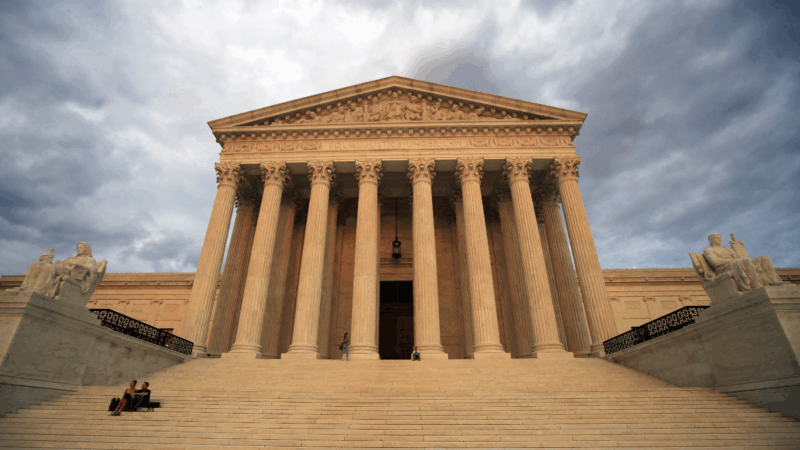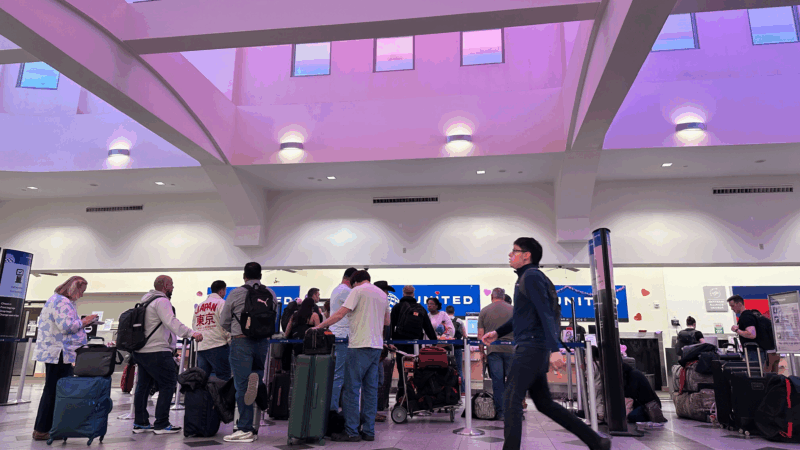ACLU warns hundreds of Venezuelans face immediate deportation under Alien Enemies Act despite Supreme Court decision
The American Civil Liberties Union late Friday warned that immigration authorities were moving to quickly restart removals under the Alien Enemies Act despite the U.S. Supreme Court’s restrictions on how it can use the act.
Late Thursday a group of Venezuelans detained in a Texas facility was advised that they would be immediately deported under the Alien Enemies Act, a rarely used 18th-century wartime law that allows for accelerated removal of foreigners deemed a threat by authorities.
ACLU lawyer Lee Gelernt told NPR that migrants at the Bluebonnet Detention Facility in Anson, Texas in the far northern end of the state were being loaded onto buses for removal late Friday.
This came despite a recent U.S. Supreme Court ruling that found the Trump administration could continue deporting under the act — only if detainees are given due process to challenge their removal. The government says 137 migrants accused of being members of the Venezuelan gang Tren De Aragua, including a group of men sent to a prison in El Salvador, have already been deported under the Alien Enemies Act.
NPR was unable to independently confirm the number of people who may be deported from this facility. The U.S. Department of Homeland Security declined to provide details or answer additional questions about the case.
“We are not going to reveal the details of counter terrorism operations, and we are complying with the Supreme Court’s ruling,” said Assistant Secretary of Homeland Security Tricia MacLaughlin.
ACLU asks Supreme Court and federal judges for emergency injunction
The ACLU late Friday asked the Supreme Court for an emergency injunction and stay of removal.The group is asking that migrants being subjected to the Alien Enemies Act be given at least 30 days advance notice.
“The notice the government is providing does not remotely comply with the Supreme Court’s order,” the ACLU argues in the request for an injunction. “At a minimum, the notice must be translated into a language that individuals can understand. Most importantly, there must be sufficient time for individuals to seek review. As during World War II, that notice must be at least 30 days in advance of any attempted removal.”
The group also unsuccessfully asked a federal judge to halt any new deportations. At an emergency hearing Friday evening federal judge James Boasberg seemed to agree the forms migrants were asked to sign regarding the Act had no information regarding their right to contest and were inadequate.
“It doesn’t say you have the right to contest, you have the right to challenge anything. It’s just telling you here’s the notice, you’re getting removed,” Boasberg told Justice Department attorney Drew Ensign. “That certainly seems problematic to me.”
The Justice Department argued that the notice complies with the Supreme Court’s guidance on the issue.
Federal judges in several districts have blocked the deportation of people using the Alien Enemies Act. The ACLU sued the administration again this week, in order to block deportations at several additional Texas detention centers, including Bluebonnet, a facility in west-central Texas about halfway between Lubbock and Fort Worth.
The ACLU alleges that in recent days, many Venezuelan migrants were specifically brought to Bluebonnet for that reason. The government denies this.
At the emergency hearing Friday, justice department lawyer Ensign said department officials were not aware of any planned deportation flights on Friday and there are no deportation plans for Saturday, but the government “reserves the right to remove people on Saturday.”
“I’m sympathetic to everything you are saying, I just don’t think I have the power,” judge Boasburg told the ACLU attorney, and said that it is now in the Supreme Court’s hands.
Boasberg earlier this week found probable cause that the Trump administration committed criminal contempt by disobeying his ruling, only to see the Supreme Court rule that only judges where migrants are being held have jurisdiction to halt their removal.
Stella M. Chávez from The Texas Newsroom and NPR’s Ximena Bustillo contributed reporting to this story.
U.S. ice dancers Madison Chock and Evan Bates win Olympic silver, in a stunning upset
Chock and Bates, four-time Olympians, were heavily favored for gold. But they lost by less than two points to a French duo who has been clouded by controversy involving their former partners.
AI brings Supreme Court decisions to life
Like it or not, the justices are about to see AI versions of themselves, speaking words that they spoke in court but that were not heard contemporaneously by anyone except those in the courtroom.
These monks’ walk for peace captivated Americans. It ends this week
A group of Buddhist monks walked from Fort Worth, Texas, to Washington, D.C., in the name of peace. The 108-day pilgrimage captivated Americans.
The airspace around El Paso is open again. Why it closed is in dispute
The Federal Aviation Administration abruptly closed the airspace around El Paso, only to reopen it hours later. The bizarre episode pointed to a lack of coordination between the FAA and the Pentagon.
‘Dawson’s Creek’ star James Van Der Beek has died at 48
Van Der Beek played Dawson Leery on the hit show Dawson's Creek. He announced his colon cancer diagnosis in 2024.
A Jan. 6 rioter pardoned by Trump was convicted of sexually abusing children
A handyman from Florida who received a pardon from President Trump for storming the U.S. Capitol on Jan. 6, 2021, was convicted on state charges of child sex abuse and exposing himself to a child.






